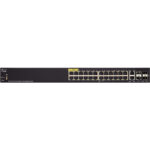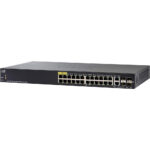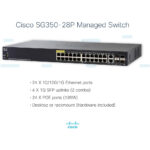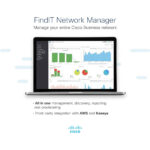





Switch Cisco SG350-28P-K9-EU
26.192.800 ₫
| Thương Hiệu |
CISCO |
|---|---|
| Bảo hành |
12 tháng |
| Switch Managed |
Layer 3 |
| Switch POE |
195W |
Cho phép đặt hàng trước
Switch Cisco SG350-28P-K9-EU
Thiết bị chuyển mạch Switch SG350-28p-K9-EU dòng sản phẩm Switch Cisco 350 một phần của giải pháp tối ưu cho doanh nghiệp với khả năng cung cấp nguồn PoE công suất 195W cho 24 cổng RJ, giúp giảm thiểu chi phí hiệu quả.
Thiết bị chuyển mạch Switch Cisco SG350-28P-K9-EU này cung cấp các tính năng bạn cần để cải thiện tính khả dụng của các ứng dụng kinh doanh quan trọng, bảo vệ thông tin nhạy cảm và tối ưu hóa băng thông mạng để cung cấp thông tin và ứng dụng hiệu quả hơn.
Cisco SG350-28P-K9-EU được thiết kế với 26 x 10/100/1000 Ports, 2 SFP Slots , 2 combo mini-GBIC ports là giải pháp hoàn hảo để cải thiện hiệu suất mạng cho các doanh nghiệp nhỏ giúp tiết kiệm nhiều hơn những chi phí.
Các tính năng nổi bật của Switch Cisco SG350-28P-K9-EU
– Hỗ trợ Giao thức quản lý mạng đơn giản (SNMP) cho phép bạn thiết lập và quản lý các thiết bị chuyển mạch và các thiết bị Cisco khác từ xa từ một trạm quản lý mạng, cải thiện quy trình làm việc CNTT và cấu hình khối lượng.
– Mã hóa lớp bảo mật nhúng (SSL) được mã hóa bảo vệ dữ liệu quản lý di chuyển đến và đi từ nút chuyển.
– Danh sách kiểm soát truy cập mở rộng (ACL) hạn chế các phần nhạy cảm của mạng để tránh người dùng trái phép và bảo vệ chống lại các cuộc tấn công mạng.
– VLAN khách cho phép bạn cung cấp kết nối Internet cho người dùng không có việc làm trong khi cô lập các dịch vụ kinh doanh quan trọng từ lưu lượng khách.
– Hỗ trợ các ứng dụng bảo mật mạng nâng cao như bảo mật cổng IEEE 802.1X giới hạn chặt chẽ quyền truy cập vào các phân đoạn cụ thể trong mạng của bạn. Xác thực dựa trên web cung cấp một giao diện nhất quán để xác thực tất cả các loại thiết bị lưu trữ và các hệ điều hành, mà không có sự phức tạp của việc triển khai các máy khách IEEE 802.1X trên mỗi điểm cuối.
– Các cơ chế bảo vệ tiên tiến, bao gồm kiểm tra giao thức phân giải địa chỉ động (ARP), IP Source Guard và Giao thức cấu hình máy chủ động (DHCP) rình mò, phát hiện và ngăn chặn các cuộc tấn công mạng có chủ ý. Các kết hợp của các giao thức này cũng được gọi là ràng buộc cổng IP-MAC (IPMB).
– IPv6 First Hop Security mở rộng khả năng bảo vệ mối đe dọa nâng cao lên IPv6. Bộ bảo mật toàn diện này bao gồm kiểm tra ND, bảo vệ RA, bảo vệ DHCPv6 và kiểm tra tính toàn vẹn ràng buộc hàng xóm, cung cấp khả năng bảo vệ tuyệt vời chống lại một loạt các cuộc tấn công địa chỉ và tấn công man-in-the-middle trên mạng IPv6.
– ACL dựa trên thời gian và hoạt động cổng hạn chế quyền truy cập vào mạng trong thời gian được chỉ định như giờ làm việc.
– Bảo mật dựa trên địa chỉ MAC thống nhất có thể được áp dụng tự động cho người dùng di động khi họ di chuyển giữa các điểm truy cập không dây.
– Công nghệ bảo mật lõi (SCT) giúp đảm bảo rằng công tắc có thể xử lý lưu lượng truy cập quản lý khi đối mặt với tấn công Từ chối dịch vụ (DoS).
– Private VLAN Edge (PVE) cung cấp lớp cách ly 2 giữa các thiết bị trên cùng một VLAN.
– Kiểm soát bão có thể được áp dụng cho lưu lượng phát sóng, phát đa hướng và không xác định.
– Bảo vệ các phiên quản lý xảy ra bằng RADIUS, TACACS + và xác thực cơ sở dữ liệu cục bộ cũng như các phiên quản lý an toàn qua SSL, SSH và SNMPv3.
– Phòng chống tấn công DoS tối đa hóa thời gian hoạt động của mạng khi có sự tấn công.
| Model | SG350-28P-K9-EU |
| Performance | |
| Switching capacity and forwarding rate | Capacity in Millions of Packets per Second (mpps) (64-byte packets): 41.66 |
| All switches are wire speed and nonblocking | Switching Capacity in Gigabits per Second (Gbps): 56 |
| USB slot | For file-management purposes |
| Total System Ports | 28 Gigabit Ethernet |
| RJ-45 Ports | 24 Gigabit Ethernet |
| Combo Ports (RJ‑45 + SFP) | 2 SFP slots, 2 Gigabit Ethernet combo |
| Jumbo frames | Frame sizes up to 9K (9216) bytes supported on 10/100 and Gigabit interfaces |
| MAC table | Up to 16K (16384) MAC addresses |
| Layer 2 Switching | |
| Spanning Tree Protocol | Standard 802.1d Spanning Tree support Fast convergence using 802.1w (Rapid Spanning Tree [RSTP]), enabled by default 8 instances are supported Multiple Spanning Tree instances using 802.1s (MSTP) |
| Port grouping | Support for IEEE 802.3ad Link Aggregation Control Protocol (LACP): Up to 8 groups, Up to 8 ports per group with 16 candidate ports for each (dynamic) 802.3ad link aggregation |
| VLAN | Support for up to 4096 VLANs simultaneously Port-based and 802.1Q tag-based VLANs MAC-based VLAN Management VLAN Private VLAN Edge (PVE), also known as protected ports, with multiple uplinks Guest VLAN Unauthenticated VLAN Dynamic VLAN assignment via RADIUS server along with 802.1x client authentication CPE VLAN |
| Voice VLAN | Voice traffic is automatically assigned to a voice-specific VLAN and treated with appropriate levels of QoS Auto voice capabilities deliver networkwide zero-touch deployment of voice endpoints and call control devices |
| Multicast TV VLAN | Multicast TV VLAN allows the single multicast VLAN to be shared in the network while subscribers remain in separate VLANs (also known as MVR) |
| Q-in-Q VLAN | VLANs transparently cross a service provider network while isolating traffic among customers |
| Generic VLAN Registration Protocol (GVRP)/Generic Attribute Registration Protocol (GARP) | Protocols for automatically propagating and configuring VLANs in a bridged domain |
| Unidirectional Link Detection (UDLD) | UDLD monitors physical connection to detect unidirectional links caused by incorrect wiring or cable/port faults to prevent forwarding loops and blackholing of traffic in switched networks |
| Dynamic Host Configuration Protocol (DHCP) Relay at Layer 2 | Relay of DHCP traffic to DHCP server in different VLAN; works with DHCP Option 82 |
| Internet Group Management Protocol (IGMP) versions 1, 2, and 3 snooping | IGMP limits bandwidth-intensive multicast traffic to only the requesters; supports 1K multicast groups (source-specific multicasting is also supported) |
| IGMP Querier | IGMP querier is used to support a Layer 2 multicast domain of snooping switches in the absence of a multicast router |
| Head-Of-Line (HOL) blocking | HOL blocking prevention |
| Loopback Detection | Loopback detection provides protection against loops by transmitting loop protocol packets out of ports on which loop protection has been enabled. It operates independently of STP |
| Jumbo frames | Up to 9K (9216) bytes |
| Layer 3 | |
| IPv4 routing | Wirespeed routing of IPv4 packets Up to 1K static routes and up to 128 IP interfaces |
| IPv6 routing | Wirespeed routing of IPv6 packets |
| Classless Interdomain Routing (CIDR) | Support for CIDR |
| Layer 3 Interface | Configuration of Layer 3 interface on physical port, LAG, VLAN interface, or loopback interface |
| DHCP relay at Layer 3 | Relay of DHCP traffic across IP domains |
| User Datagram Protocol (UDP) relay | Relay of broadcast information across Layer 3 domains for application discovery or relaying of bootP/DHCP packets |
| DHCP Server | Switch functions as an IPv4 DHCP server serving IP addresses for multiple DHCP pools/scopes Support for DHCP options |
| Security | |
| Secure Shell (SSH) Protocol | SSH is a secure replacement for Telnet traffic. SCP also uses SSH. SSH v1 and v2 are supported |
| Secure Sockets Layer (SSL) | SSL support: Encrypts all HTTPS traffic, allowing highly secure access to the browser-based management GUI in the switch |
| IEEE 802.1X (Authenticator role) | 802.1X: RADIUS authentication and accounting, MD5 hash; guest VLAN; unauthenticated VLAN, single/multiple host mode and single/multiple sessions Supports time-based 802.1X Dynamic VLAN assignment |
| Web-based authentication | Web based authentication provides network admission control through web browser to any host devices and operating systems |
| STP Bridge Protocol Data Unit (BPDU) Guard | A security mechanism to protect the network from invalid configurations. A port enabled for BPDU Guard is shut down if a BPDU message is received on that port |
| STP Root Guard | This prevents edge devices not in the network administrator’s control from becoming Spanning Tree Protocol root nodes |
| DHCP snooping | Filters out DHCP messages with unregistered IP addresses and/or from unexpected or untrusted interfaces. This prevents rogue devices from behaving as DHCP Servers |
| IP Source Guard (IPSG) | When IP Source Guard is enabled at a port, the switch filters out IP packets received from the port if the source IP addresses of the packets have not been statically configured or dynamically learned from DHCP snooping. This prevents IP Address Spoofing |
| Dynamic ARP Inspection (DAI) | The switch discards ARP packets from a port if there are no static or dynamic IP/MAC bindings or if there is a discrepancy between the source or destination addresses in the ARP packet. This prevents man-in-the-middle attacks |
| IP/MAC/Port Binding (IPMB) | The preceding features (DHCP Snooping, IP Source Guard, and Dynamic ARP Inspection) work together to prevent DOS attacks in the network, thereby increasing network availability |
| Secure Core Technology (SCT) | Makes sure that the switch will receive and process management and protocol traffic no matter how much traffic is received |
| Secure Sensitive Data (SSD) | A mechanism to manage sensitive data (such as passwords, keys, and so on) securely on the switch, populating this data to other devices, and secure autoconfig. Access to view the sensitive data as plaintext or encrypted is provided according to the user-configured access level and the access method of the user |
| Layer 2 isolation Private VLAN Edge (PVE) with community VLAN | PVE (also known as protected ports) provides Layer 2 isolation between devices in the same VLAN, supports multiple uplinks |
| Port security | The ability to lock source MAC addresses to ports and limits the number of learned MAC addresses |
| RADIUS/TACACS+ | Supports RADIUS and TACACS authentication. Switch functions as a client |
| Storm control | Broadcast, multicast, and unknown unicast |
| RADIUS accounting | The RADIUS accounting functions allow data to be sent at the start and end of services, indicating the amount of resources (such as time, packets, bytes, and so on) used during the session |
| DoS prevention | Denial-Of-Service (DOS) attack prevention |
| ACLs | Support for up to 512 rules Drop or rate limit based on source and destination MAC, VLAN ID or IP address, protocol, port, Differentiated Services Code Point (DSCP)/IP precedence, TCP/UDP source and destination ports, 802.1p priority, Ethernet type, Internet Control Message Protocol (ICMP) packets, IGMP packets, TCP flag, time-based ACLs supported |
| Quality of Service | |
| Priority levels | 8 hardware queues |
| Scheduling | Strict priority and Weighted Round-Robin (WRR)Queue assignment based on DSCP and class of service (802.1p/CoS) |
| Class of service | Port based; 802.1p VLAN priority based; IPv4/v6 IP precedence/Type of Service (ToS)/DSCP based; Differentiated Services (DiffServ); classification and remarking ACLs, trusted QoS |
| Rate limiting | Ingress policer; egress shaping and rate control; per VLAN, per port, and flow based |
| Power over Ethernet (PoE) | |
| 802.3af PoE, 802.3at PoE+, and 60W PoE power are delivered over any of the RJ-45 ports within the listed power budgets | Switches support 802.3at PoE+, 802.3af, 60W PoE, and Cisco prestandard (older) PoE. Maximum power of 60W to any 10/100 or Gigabit Ethernet port for PoE+ supported devices and 15.4W for PoE supported devices, until the PoE budget for the switch is reached. The total power available for PoE per switch is as follows: Power Dedicated to PoE: 195W Number of Ports That Support PoE: 24 |
| PoE powered device and PoE passthrough | In addition to AC power, compact switch models can work as PoE powered devices and be powered by PoE switches connected to the uplink ports. The switch can also pass through the power to downstream PoE end devices if required Maximum of 60W can be drawn per uplink port if the peer PoE switch supports 60W PoE. When multiple uplink ports are connected to PoE switches, the power drawn from these ports is combined When AC power is connected and functioning properly, it will have priority over the PoE powered device function. The PoE powered device function will then act as a backup power source to the AC power. The PoE powered device function will be the primary power source for the switch if AC power is not connected |
| Power Option | AC power |
| Available PoE Power (W) | 62W |
| Can Switch Be Powered with Uplinks | Yes |
| Environmental | |
| Dimensions | 440 x 44 x 257 mm |
| Weight | 3.83 kg |




















